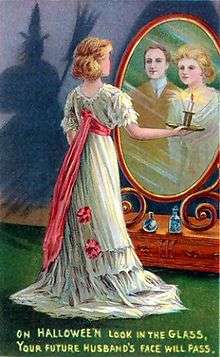Bloody Mary (folklore)

Bloody Mary is a folklore legend consisting of a ghost, phantom or spirit conjured to reveal the future. She is said to appear in a mirror when her name is called three times. The Bloody Mary apparition may be benign or malevolent, depending on historic variations of the legend. The Bloody Mary appearances are mostly "witnessed" in group participation play.
Ritual
Historically, the ritual encouraged young women to walk up a flight of stairs backwards while holding a candle and a hand mirror, in a darkened house. As they gazed into the mirror, they were supposed to be able to catch a view of their future husband's face.[1] There was, however, a chance that they would see a skull (or the face of the Grim Reaper) instead, indicating that they were destined to die before they would have the chance to marry.[1][2]
In the ritual of today, Bloody Mary allegedly appears to individuals or groups who ritualistically invoke her name in an act of catoptromancy. This is done by repeatedly chanting her name in a mirror placed in a dimly-lit or candle-lit room. The Bloody Mary apparition allegedly appears as a corpse, a witch or ghost; can be friendly or evil; and is sometimes "seen" covered in blood. The lore surrounding the ritual states that participants may endure the apparition screaming at them, cursing them, strangling them, stealing their soul, drinking their blood,[3] or scratching their eyes out.[4] The modern legend of Hanako-san in Japan strongly parallels the Bloody Mary mythology.
A modern addition of taunting Bloody Mary regarding her baby indicates the legendary figure's conflation with the historic figure, Queen Mary I, also known as "Bloody Mary", whose life was marked by a number of miscarriages or false pregnancies[5] and is remembered for her violent religious reforms.[6]
Phenomenon explained
Staring into a mirror in a dimly-lit room for a prolonged period can cause one to hallucinate.[7] Facial features may appear to "melt", distort, disappear, and rotate, while other hallucinatory elements, such as animal or strange faces, may appear. Giovanni Caputo writes that this phenomenon, which he calls the "strange-face illusion", is believed to be a consequence of a "dissociative identity effect", which causes the brain's facial-recognition system to misfire in an as-yet unidentified way.[7] Other possible explanations for the phenomena include illusions attributed, at least partially, to the perceptual effects of Troxler's fading,[8][7] and possibly self-hypnosis.
In popular culture
The legend of Bloody Mary has served as inspiration for a number of movies, television shows, and video games dealing with the supernatural.[5]
See also
References
- 1 2 Ellis, Bill (2004). Lucifer Ascending: The Occult in Folklore and Popular Culture. University of Kentucky Press. ISBN 0-8131-2289-9.
- ↑ Hutton, Ronald (2001). Stations of the Sun: A History of the Ritual Year in Britain. Oxford University Press. ISBN 0-19-285448-8.
- ↑ Bloody Mary at Urban Legends
- ↑ Bloody Mary; www.Halloween–Website.com; accessed .
- 1 2 "Urban Legends Reference Pages: Bloody Mary". Snopes.
- ↑ Loades, pp. 207–208; Waller, p. 65; Whitelock, p. 198
- 1 2 3 Caputo, Giovanni B (2010). "Strange-face-in-the-mirror illusion". Perception Magazine. Pion. 39 (7): 1007–1008. doi:10.1068/p6466. PMID 20842976. Retrieved October 18, 2012.
- ↑ An Optical Illusion that Explains the Origins of Imaginary Monsters; accessed December 2013.
